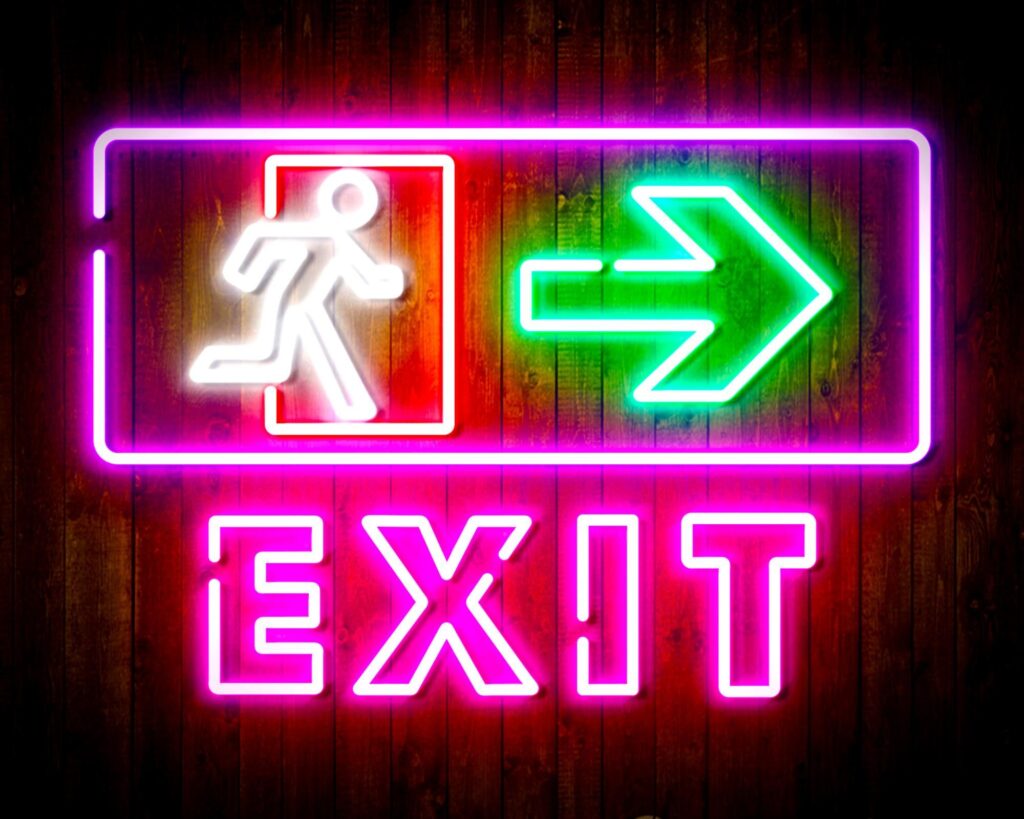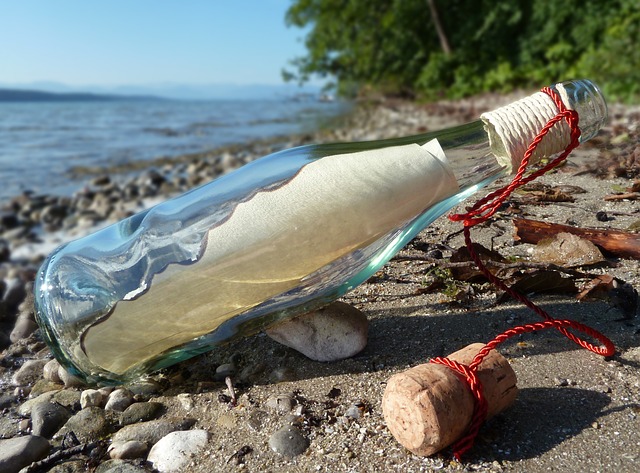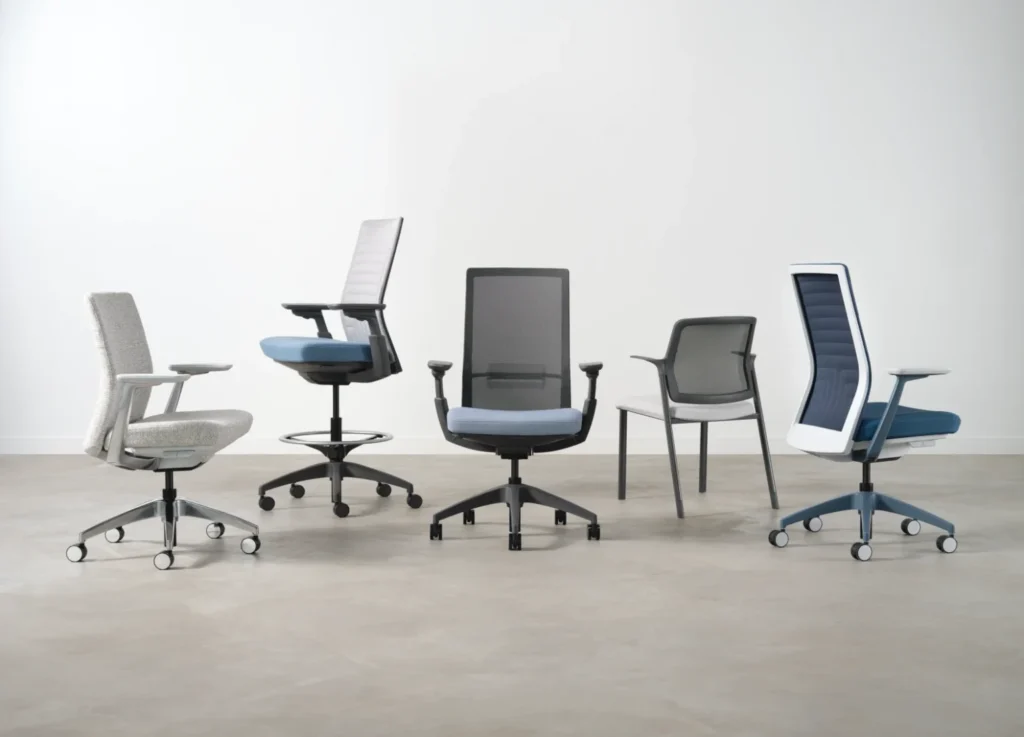Imagine an Exit

Rob Grant has died. He co-created Red Dwarf, my favourite TV comedy sci-fi thing of the 1980s and 90s. As well as the TV series, there were some fab novels.
The second novel was called Better Than Life and involved a virtual reality game that made your wildest dreams come “true” but trapped you inside them. In the real-world, meanwhile, your biological body withers and dies.
While the three main crew are trapped in the game, Kryten, the ship’s service robot, attempts a rescue mission:
In theory, leaving BTL was simple. All the player had to do was want to leave. All the player had to do was imagine an exit, and pass through it, back to reality.
Kryten had imagined his gateway easily enough, but as he was about to pass under the pink neon ‘Exit’ sign, a cafeteria materialized to his right. In the window was a handwritten card which read: ‘Dishwasher wanted.’
The cafeteria was deserted, but in the kitchen, stacked ceiling-high, were several huge towers of dirty dishes piled around a sink. Now, what kind of sanitation Mechanoid would he have been if he’d ignored those greasy, food-stained plates?
I’ll just wash a few, he’d thought. Reduce the pile a bit.
Eight months later, he was still there, still washing, still surrounded by stacks of dirty dishes. Finally he realized he’d been duped – the Game had found his innermost desire – and he’d scurried off, ashamed.
Mechanoids weren’t supposed to have desires.
It’s all there, isn’t it? The need to feel useful. The job that traps you. The technology that needs your attention. The vampiric theft of your life force. The door being open all along – so long as you want to see it.
Rest in peace, Rob Grant, whose name means to take and then give.
A great old Red Dwarf line is that “death isn’t the handicap it used to be in the olden days. It doesn’t screw your career up the way it used to.” Well, oddly enough “stiffie” Grant’s got a book coming out in July.
*
I Look for Exits
I look for exits. I mean, if you can get in you must be able to get out. I think to myself. How do you open a door that won’t open? Do you kick it down? Break it down? Set fire to it? Locksmith? Wishful thinking? Secret codes? Magic words? I can’t help feeling there’s something I ought to do.
From On the Calculation of Volume by Solvej Balle, the seven-volume literary time loop sensation currently sweeping Europe.
*
It’s Easier to Pause When You Don’t Have to Maximise Every Minute

The Guardian asks why an international “sex drought” has spared Denmark.
Good question. Except it’s not really about sex. Or Denmark.
That we don’t have as much sex as we did in the 1990s is an indicator — a warning light on a dashboard somewhere — of a deeper problem (and its solutions).
As well Denmark having a culture that’s kind to sexual minorities and isn’t shy about sexual conversation in general:
there’s no student debt in Denmark; students get paid more than €600 a month to study; it’s very common to take a year or often two out between school and university, so everyone’s more confident by the time they start studying.
Did you hear that? Young Danes aren’t stiffed by loans that can never be repaid. They’re even given a stipend. And time to breathe.
“It’s easier to pause,” a Danish student says, “when you don’t have to maximise every minute.” They’re more likely to go on a date, one of many activities a person might enjoy when they’re not run ragged by a joyless study-pay-work-pay-die system.
This Danish sex story is a case study to show (for the thousandth time) that people are happier and healthier and more alive when their prospects — and the fabric of everyday experience — aren’t destroyed by the juicing mechanism of The Trap.
The Trap, lest we forget, is set by the bastards who call themselves politicians and businessmen. Not by refugees. Not by dole scum. Not by your neighbours.
Until The Trap is destroyed by a lovely uprising, we’ll have to teach ourselves how to escape. Where The Trap presents you with debt and toil to the extent that you can no longer even enjoy your private parts, say “no thank you” and find a way out.
*
AI is Stupid

From The Baffler:
As of 2025, 95 percent of companies that invested in [generative] AI did not profit at all from the investment […] As the tech journalist Edward Zitron estimated in his guide to the racket, by “the end of 2025, Meta, Amazon, Microsoft, Google and Tesla will have spent over $560 billion in capital expenditures on AI in the last two years, all to make around $35 billion.” That’s like spending $100 to make $6.25—and then doing it again and again, five billion times.
Upper-echelon tech bros are idiots.
If you’re bored by the ceaseless “AI”-related witterings of a media in thrall to these idiots, especially in light of the revelation above, read New Escapologist instead.
The Baffler, incidentally, is one of America’s few left-wing media outlets with any clout, yet it wrings its hands over the same topics as any business dad of the conservative press. “Is AI really coming for entry-level jobs first, and the rest of the workforce next?” it asks. Yawn.
The article doesn’t mention UBI once, the only seriously proposal for replacing Wage Slavery as a way to feed people. Their use of “bullshit” in the headline — a word generally reserved in work-related conversation for thankless drudgery since our David’s Bullshit Jobs in 2013 — is little better than clickbait. Neither the word nor the sentiment appears in the article.
I don’t think we mention AI once in the current edition of New Escapologist, and we’ll probably maintain our aloof and studious silence until someone convinces us that AI will help real people to escape their day jobs with an income intact.
Our publication, written and published by human beings, is available in digital formats or on papier, singly or by subscription. We recommend clicking “notify me when back in stock” or otherwise hassling Magazine Café in New York for a copy if you’re in America.
Attention America!

Americans! What with the various shipping problems we’ve been having between our two landmasses (not least the ridiculous cost), I’d like to recommend Magazine Café as a place to order New Escapologist in print.
They are a real-life brick-and-mortar store in New York City, so you’ll be supporting their pleasant enterprise as well as ours. Issues 18 and 15 seem to be in stock for $16.50 each with free shipping. There also seems to be a subscription offer.
Shall we try and sell them out? Hopefully that will mean they can order the next issue in larger quantities AND solve the logistical problem of getting the magazine onto American soil.
Other US stockists are available. I’ve just had good feedback about these guys and not all stockists offer a mail-order service.
Unscreened
Globally, on average, people seem to spend close to half their waking hours looking at screens, and among young people in the rich world the number is a good deal higher than that.
Isn’t that the saddest thing you’ve ever heard?
I don’t say screens are an inherently bad thing. They’re useful when you want to, you know, look something up on Wikipedia or type something or lazily read a few blog posts. But that’s bananas. To be clear, it says waking hours, not working hours. So in other words: half your life. Your LIFE.
This is your occasional reminder that you can at least escape social media if you want to, winning back at least two hours a day and therefore about 750 hours of your life each year.
I recently received some nice paper mail from Jonny, a New Escapologist contributor who has turned his Substack newsletter for writers (already a noble step away from the worst of social media) into a paper newsletter for anyone who requests it. It was lovely to get. My address had been typewritten on the envelope, the newsletter itself was simple and pleasantly laid out on a single folded sheet of A4, and I think he might have coloured in the letterhead (a pineapple) by hand. Thanks, Jonny.
It made me think about Analog Sea Review, a muscular and wilfully offline publishing enterprise. I pulled my copies down from the shelf and spent some pleasant time reading high-quality essays and poetry selected not by dubious algorithm but by a real person I trust.
When I searched for the “at least two hours a day” statistic cited above, the report it came from notes that “despite the apparent expansion of social media’s role in our lives, the amount of time that we spend using social platforms has actually declined over the past two years.”
So there is a pushback against this screen mania. Good.
More from the Guardian:
[we all] already have things we do and care about that put us beyond the reach of the algorithms. We all already know the deepest truth: that true human attention isn’t the click and swipe of screen time. True human attention is love, curiosity, daydreaming and taking care of ourselves and others.
The piece was written by a trio of activists called the Friends of Attention, another pillar of the resistance. They blame this screentime madness on “human frackers,” unscrupulous business interests who pump us full of crap to mine the resource that is our precious attention.
Get offline. Buy a nice notebook. Read books and magazines. Use the library. Walk.
*
Letter to the Editor: Like a Dissatisfied Chimp
To send a letter to the editor, simply write in. You’ll get a reply and we’ll anonymise any blogged version.

Reader M writes:
Thanks, as ever, [for the newsletter]. There are thoughts on my mind right now…
Being somewhat short of cash again (again, again…), I’m learning to “want what I have” instead of what I don’t have. This has involved a joyful replay of my old LPs and CDs: old friends I forgot I had.
Time slowed down, as I wasn’t permanently clicking buttons like a dissatisfied chimp when the first ten seconds of a track failed to ignite my interest. I’ve now cancelled Sp*tify.
On a recent podcast, the host mentioned that they watch out for apps which “have access to them.” An interesting concept. I don’t access X, for example. IT accesses me. So true.
Keep fighting the good fight.
*
Thanks M. Your LP and CD odyssey reminds me of Friend David Cain’s Depth Year. It puts quality over quantity, is cheaper, and more rewarding. Capitalism makes us want more,-more-more instead of appreciating what we already have. That includes wide open freebies like nature and good company, but since most of us were more rampant consumers in the past we’re probably also sitting on a wealth of recorded culture in the form of records and books and videos. In situations where we have more time than money, the solution is precisely as you describe. Go deep instead of wide for a while. That’s no defeat, it’s an opportunity to finally enjoy something instead of merely acquiring it.
*
Chair of the Month

In doing research for Issue 19, I chanced upon a website called Work Design Magazine. I do not sneer at it: the world of work, after all, needs to be improved. If only for wage slaves to have somewhere nicer to plot their escapes.
Amazingly, they have a column called Chair of the Month in which they review a different office chair each time. It’s been running since March 2023.
One shouldn’t really be amazed. Of course a publication about office design would take an interest in chairs. It’s still funny though.
The granularity of special interest and trade magazines was precisely the spark that set off New Escapologist in the first place. Ours is a niche magazine for those engaged in plotting their escape. That’s supposed to be funny because it makes one wonder what the contents of such a magazine could possibly be, what our equivalent of “Chair of the Month” might be.
For anyone yet to buy a copy of our physical magazine, our columns include:
* Workplace Woes – in which our readers blow off steam about their crap workplaces
* Scarpernautics – the latest technical developments for those on the run
* Notices for Wage Slaves – a pin board for those still stuck in day jobs
* Master Flee – a letter from your Escapologist-in-Chief
We also print escape-relevant cultural reviews, lengthy feature articles that might concern escape artists, interviews with expert lock pickers, and thoughtful columns from those who’ve legged it.
Divorce Ring
Fancy ladies have been buying divorce rings.
Obviously it’s just another act of high consumerism, but it warrants a mention here as a way to honour an escape.
People also do it with tattoos.
I asked my wife for her take on the trend. She says “I think people should think about themselves a bit less.”
*
On the other hand, New Escapologist Issue 18 is shipping now. Go! Go! Go!
Wee
I enjoyed this video about a tiny house in the Scottish Highlands.
In most ways it’s a pretty typical video for this channel, but the model of “have a tiny, safe, minimalist base while also travelling the world” is writ large and sweet.
When viewing YouTube videos, be sure to have the free version of AdBlockPlus installed as a browser extension and take this staggeringly simple precaution against allowing SHITE into your eyeholes.
*
New Escapologist Issue 18 is available and shipping now. Go! Go! Go!



